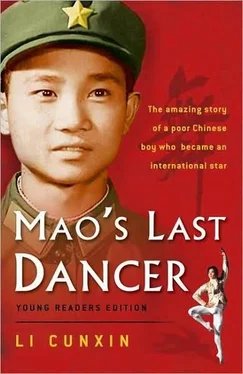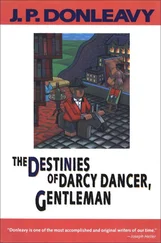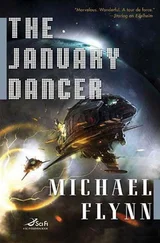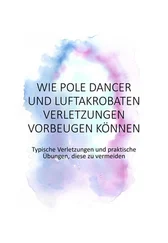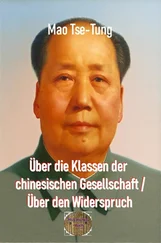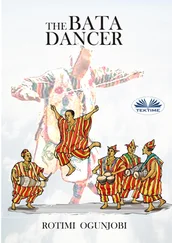Li Cunxin - Mao's Last Dancer
Здесь есть возможность читать онлайн «Li Cunxin - Mao's Last Dancer» весь текст электронной книги совершенно бесплатно (целиком полную версию без сокращений). В некоторых случаях можно слушать аудио, скачать через торрент в формате fb2 и присутствует краткое содержание. Жанр: Современная проза, на английском языке. Описание произведения, (предисловие) а так же отзывы посетителей доступны на портале библиотеки ЛибКат.
- Название:Mao's Last Dancer
- Автор:
- Жанр:
- Год:неизвестен
- ISBN:нет данных
- Рейтинг книги:3 / 5. Голосов: 1
-
Избранное:Добавить в избранное
- Отзывы:
-
Ваша оценка:
- 60
- 1
- 2
- 3
- 4
- 5
Mao's Last Dancer: краткое содержание, описание и аннотация
Предлагаем к чтению аннотацию, описание, краткое содержание или предисловие (зависит от того, что написал сам автор книги «Mao's Last Dancer»). Если вы не нашли необходимую информацию о книге — напишите в комментариях, мы постараемся отыскать её.
Mao's Last Dancer — читать онлайн бесплатно полную книгу (весь текст) целиком
Ниже представлен текст книги, разбитый по страницам. Система сохранения места последней прочитанной страницы, позволяет с удобством читать онлайн бесплатно книгу «Mao's Last Dancer», без необходимости каждый раз заново искать на чём Вы остановились. Поставьте закладку, и сможете в любой момент перейти на страницу, на которой закончили чтение.
Интервал:
Закладка:
During those summers, some of the nights were unbearably hot. We had no fans in our house, and the breezes were too slight to blow away the swarming mosquitoes. To keep us out of mischief during these hot summer nights, the adults always told us stories. The most popular storyteller was the Wuho man, who had given my niang the cure for our warts. We loved him. He told good Kung Fu stories and countless fascinating fables. When he died a few years later, I went to see his body lying in a simple coffin. It seemed as though his body had shrunk. He had no children, so his coffin was donated by the neighbours and his burial ceremony was simple. I missed him and his enticing stories-they had a profound effect on my life.
One of my favourite activities on those summer days was catching dragonflies. They would rest on the water in the dams and I would sit by the edge and wait for them, a bamboo broom at the ready. I would tiptoe up to them, sweep them with my broom into the water, and then lift them out. Then I would tie the females to a wooden stick and circle the dragonfly aloft, so she would attract male dragonflies. I would pull down the mating pair, slowly, in circles, and catch the male when it was within reach. I caught flies or worms to feed my dragonflies, and I would let them go at night.
I also liked to catch crickets, but only male crickets, which we used in cricket fighting competitions. I loved the sound the crickets made-it was just like music or singing. Night or day I would follow the crickets' singing until I caught one, but we had to take care because we often looked in dangerous areas where there might also be snakes. The crickets were smart little creatures: they concealed their homes well, and would stop their singing long before I got close. A lot of patience was needed.
I was kind to my crickets and tried to provide them with the best food and housing I could. I kept them in glass bottles with rocks, dirt and even grass, along with their water and food, but often my brave cricket fighters would become big and lazy on the good food I fed them. I would reward my top fighter with a female for company. It is not surprising then, that one of my favourite fables the Wuho man used to tell us was about a cricket. We would sit around the Wuho man in a huge circle, mostly with no clothes on because it was so hot, and he would begin, one hand smoothing his long silver beard, his ancient pipe in the other:
Once there was a Chinese emperor who loved cricket fighting. Each year the emperor required the governors in each province to donate their best crickets. To win the emperor's favour, each governor ordered his people to search for the best crickets all over the land. Under a mountain in a small village lived a poor family, with one ten-year-old son. They named him Brave Hero. His father was a courageous hunter and his mother was kind. They loved their boy. He was the sunshine in their eyes. One day the father came home from the mountains with his biggest catch, a beautiful cricket. He named the cricket Brave Hero, after his boy. The father was relieved-he would have been fined heavily if he hadn't found a cricket within twenty-four hours. The young boy was beside himself with this cricket. He begged his father to allow him to look at it. At first his father said no, but the boy kept begging and he eventually relented. Just as the boy opened the bamboo tube in which the cricket was kept, the cricket jumped out and hopped away. Their rooster near by ate the cricket up. The boy's father was in such a rage over the loss of the cricket that he ordered his son to find another cricket or else never return. The poor boy went into the mountains. They found him next day lying on a big rock, almost dead. The father cried his heart out. As he picked up his son's limp body, a small and ugly cricket jumped on the boy's pale face. The father brushed the cricket off and carried the boy home. The parents wept over their dying boy. They placed him in a coffin in the middle of their living room waiting for the last breath to leave him. As they prayed in front of the coffin, they heard the faint sound of a cricket. It was the same ugly cricket that the father had brushed away from the boy's face before. The father was very annoyed and threw it outside. Moments later the governor came to collect the cricket and the father told him that he had none. Just as the angry governor was ordering his guards to burn down the house, they heard a cricket singing from the house. Its sound was strong and loud. They followed the sound to the bamboo tube and found the same little cricket inside. The governor thought the hunter was playing a joke with him when he saw this ugly little cricket and he threw the cricket towards the rooster. Just as the rooster was about to eat the cricket, the cricket jumped onto the rooster's crown and after a brief struggle the rooster dropped dead. The governor was very impressed. He asked the hunter if he had a name for the cricket. The hunter told him that he called it Brave Hero. Brave Hero quickly became the number one fighter in the kingdom. He never lost a fight. He even beat the emperor's fighting roosters. The emperor treasured him. Back in the mountain village, the boy was still breathing. As long as their son breathed the couple would keep him lying in their living room. As the cricket-fighting season drew to a close, the emperor ordered the governor to reward the original finder of the cricket with some gold and silver because the cricket had given him such pleasure. But the parents' sorrow was too deep. Material things could not bring their son back. One day, Brave Hero mysteriously disappeared from his royal cage in the palace. On that same day the boy became alive again. The little cricket was Brave Hero's spirit. He had turned himself into the cricket to save his family.
I loved this tale. I loved the boy's bravery and I wished that I too could turn myself into a cricket and save my family from poverty. What a shame Chairman Mao didn't like cricket fights.
Our childhood in the Li Commune could never be just games and fables of course. It was around this time that the Cultural Revolution reached its most chaotic period, from about the middle of 1966. Jing Tring and I were too young to participate-six, seven, eight years old. But my three eldest brothers did. They would go out in the evenings and return late at night. They would tell me horror stories about the young Red Guards, how they burnt and destroyed anything that had a Western flavour: books, paintings, artwork-anything. They tore down temples and shrines: Mao wanted communism to have no competition from other religions. Communism was to be our only faith. The young Guards would travel to other regions and investigate possible counter-revolutionary suspects. They only had to mention Chairman Mao's name and the Red Guards would not have to pay for a thing. For a brief period, those young Guards nearly bankrupted China and the country teetered on the edge of civil war as different factions of the military supported different government leaders. But back in the New Village, we knew little of that wider picture.
My parents tried their hardest to persuade my brothers to stay home on those evenings. They even threatened to lock them out if they returned too late. But in reality there was nothing they could do-there was an unstoppable political heatwave sweeping through China. Emotions ran high and wild, especially among young people and especially in the major cities.
Then, one day, the well-respected head of our village was accused of being a counter-revolutionary. My brothers and I watched as a group of counter-revolutionaries were paraded through our village, with heavy blackboards around their necks and tall, pointed white paper hats on their heads. Their crimes were written in chalk on the boards around their necks and their names were written on their hats. They had to stand on a temporary platform in the centre of the commune square and confess their crimes to the massive crowd. We went along to watch. The officials and Red Guards handed out propaganda papers. The noise from the crowd was horrendous. One man kept shouting propaganda slogans with a hand-held speaker. People were shouting and jeering. During their confessions the accused had to lower their heads to avoid the objects that were thrown at them. If anyone looked up, he would be regarded as arrogant or too stubborn to change and too deeply influenced by capitalist filth. They could do nothing right: if they spoke softly they were smacked and accused of hiding something, and if they spoke loudly they were kicked and accused of having an "evil landlord-like attitude". Their confessions were often disrupted by the man with the hand- held speaker, who shouted revolutionary slogans such as "Knock down and kill the capitalists!" or "Never allow Chiang Kaishek and the landlords to return!" or "Never forget the cruel life of the old China and always remember the sweet life of the new China!" And of course there were the endless "Long live Chairman Mao! Long, long live Chairman Mao!" slogans. The revolutionaries constantly pulled the counter-revolutionaries' heads back up to humiliate them even more. Often their hats would come off-almost all of them had shaved their heads to avoid their hair being ripped out.
Читать дальшеИнтервал:
Закладка:
Похожие книги на «Mao's Last Dancer»
Представляем Вашему вниманию похожие книги на «Mao's Last Dancer» списком для выбора. Мы отобрали схожую по названию и смыслу литературу в надежде предоставить читателям больше вариантов отыскать новые, интересные, ещё непрочитанные произведения.
Обсуждение, отзывы о книге «Mao's Last Dancer» и просто собственные мнения читателей. Оставьте ваши комментарии, напишите, что Вы думаете о произведении, его смысле или главных героях. Укажите что конкретно понравилось, а что нет, и почему Вы так считаете.
